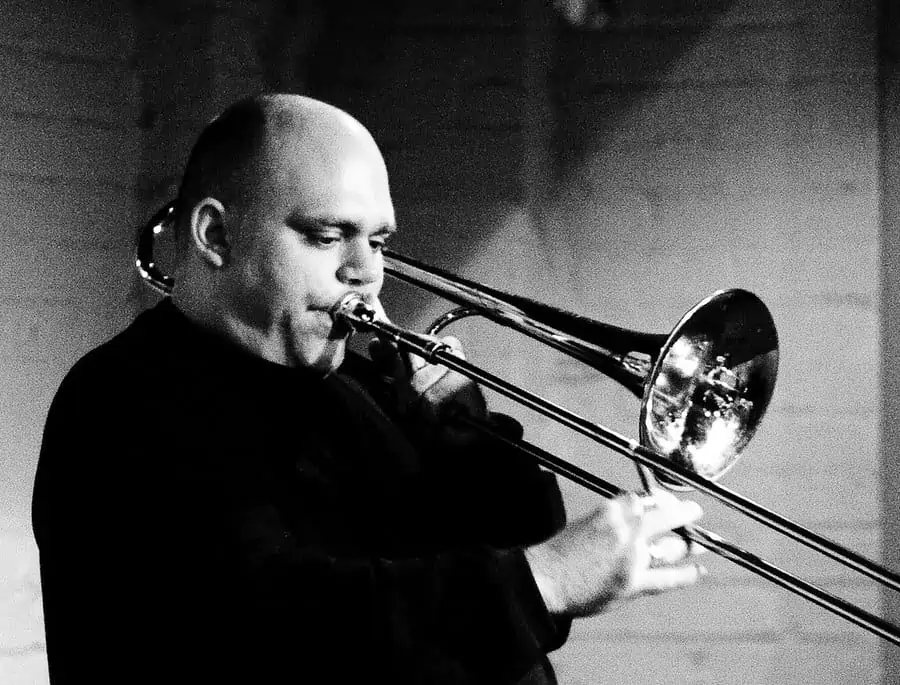Trombone Practice
Would you like to spice up your trombone practice?
Exactly what is the one important thing which can help get your performing to the next level? Practice! But not just playing the same thing again, and again, and again. We have a technique to practice efficiently – and within our ‘Beginner’s Guide To Learning The Trombone’, we’ll teach you the tricks and tips to help you practice much better, not longer.

Why Longer Trombone Practice Doesn't Equal Good Practice
Practice. If you do it regularly enough, you’ll end up being excellent. We all know this. So why is practice so difficult?
Motivation is key. Without motivation, you will not force yourself to return to the instrument day after day. How can you get motivated?
By winning. Yes, that’s what I said. Winning. You’re in regular competition with yourself, and whenever things go nicely, you feel like you’re winning. When you’re in this particular state of mind, it is very easy to practice. It’s the circle of life – winning much more gives you much more motivation, so you practice a lot more. Practicing, even more, means you win more, so it will give you far more motivation. And that goes on and on exponentially.
If it’s so easy, how come practice still so hard?
Drum roll… The answer? Because it’s not really that easy! Just practicing isn’t good enough. You might practice for five hours on a daily basis and not improve.
If it’s not the quantity of practice that sets you onto the circle of life, precisely what does?
The quality.
Practicing for fifteen minutes every day, focused, useful high-quality practice is far more effective than 4 hours of unfocused, ‘auto-pilot’ practice.
So all you need is top quality practice so that you can jump aboard the circle of life train?
You wish! It is never that easy. Incorporate quantity and quality, and you’ll finally be a first-class passenger.
Please read on to see how to buy your first-class ticket, and how to continue on the train for as long as you want…

Structure Your Trombone Practice
How much time do i need to be practicing each and every day?
15 to 20 mins is a good place to start and in all likelihood no more than 45 minutes at the same time. After this time period, all of us humans have a tendency to zone out – and therefore the practising ends up being less useful. As a rule of thumb, when you feel your concentration waning, quit. Become pleased that you just showed up to your practice session, and don’t fret over how much time you practice for.
How frequently do I need to be practicing the Trombone?
This one is a simple answer – practice each day. Like that, you’ll transform your trombone practice into a habit. A concise, targeted everyday practice is more advantageous than twice every week 1 hour at a time. And keep in mind, if you’re pondering “but how will I spare the time to carry out 20 mins every day? !? ” – just grab some of your time and effort from social media over to the trombone. We do, after all, dedicate on average 142 minutes on social media on a daily basis!
When should I be doing my practice?
It makes no big difference when you practice, simply just providing you do practice. Test out making a fixed schedule for yourself versus being ad-hok. See which options are best, and adhere to it.
Trombone Practice Top Tips
1. Remove Potential Distractions
Think of your practice moment as ‘you time’. You are hopefully playing the trombone because you love it; so turn off your phone, tablet computer, laptop, watch, as well as any other device that’ll distract you!
2. Make Certain You're Comfortable
As you’ll hopefully be playing for many hours and many years to come, it’s really crucial that you are comfortable. The comfier you are, the better you’ll perform. Anxiety is definitely our adversary, so make it away from your practice space.
3. Setting Goals
What do you want to accomplish? Try to establish a mission you could achieve as part of your practice session. Using aims, you’ll develop much faster and a lot more efficiently.
Create a strategy, and stay with it. Monday, Wednesday and Friday could possibly be studying 8 brand-new bars/measures; with Tuesday and Thursday piecing together the things you know. Arrange for yourself a reward, and if you achieve your chosen targets, open that benefit using a corkscrew!
4. Discover Your Undesirable Habits
All of us get it wrong, well before we get it correct. It’s called training! The most obvious key should be to remove the wrong points quickly. If you don’t do that, then we begin to acquire undesirable habits.
And whenever you see a horrible habit – say hi to it. Recognize it’s there, and smash the tiny blighter before it’s too late…
The same goes for repairing technical issues with things such as posture and your technique. Although it takes longer in advance, it’ll fork out dividends later on and will save you a huge amount of time.
5. Don't Shut Your Eyes
Have you been driving, and suddenly discovered that you can’t remember the last half an hour? Or been on a journey which lasts many hours, however you could only recall particular sections? This is what I call being on ‘auto-pilot’. It is precisely what we need to avoid during practice.
If you practice much the same way each time, your development will slow, your motivation will decrease, and the trombone will turn into a chore. It is possible to battle this tiny annoying fact by switching your practice strategies.
There are lots of solutions. Shut your eyes to perform. Try performing the piece of music backwards. Try standing up or being seated. Play whilst using headphones. Have fun with everything gently, or perhaps loudly. The list goes on and on. Creation is definitely the name of the game, and whatever you decide to do, don’t get bored!
6. Become Your Personal Teacher
There exists a good reason the majority of us go to school; and it’s because we understand best when we have a instructor standing over us, encouraging us to advance. But unless you are the Founder of Microsoft, you’re unlikely to be able to afford to pay for a teacher 365 days of the year. Does it matter? Certainly not! You are your own personal instructor – and also you come for free!
First of all, quickly learn how to listen. Many people fail to remember to actively listen, however it’s the best way to boost your playing.
Next, along with the miracles of modern technology, it’s now incredibly easy to record your playing. So get your smartphone out, record, and critique yourself.
And even if the world’s most wealthy people wanted to hire my personal coach, they couldn’t afford it!
7. Don't Get started At The Start
It feels right to start a piece at the beginning. The problem is if you do that each session, the initial few notes will sound awesome, but become disproportionately practised in comparison to the remainder of the piece. Mix it up. Begin right at the end! Or in the middle! Or close your eyes and randomly select a section. Just don’t always begin from the beginning!
8. Don't Just Play The Simple Bits
We are all interested in the path of least resistance. In music, that means performing the easy pieces. When we find an easy bit that sounds good, most of us usually tend to play it repeatedly. The issue with this is that we don’t advance. It’s actually a terrible practice approach. So bypass the straightforward pieces, and concentrate on the portions that you’ll really need to work hard at.
Think logically now; which elements do you need to learn first? Yes, that’s correct. The challenging elements. The easy bits will sort themselves out.
Go on then! Discover those hard pieces…
9. Try out Something Totally New
One of the best techniques you can discover is sight-reading. But what exactly is sight-reading? It’s playing anything that is put in front of you, immediately and without hassle. The objective isn’t to always be perfect. It’s to get through it as best as you can whilst always keeping tempo.
10. Tick Tock
The metronome is there as your buddy, not foe. So take advantage of it and get to like it.
For pieces that happen to be really fast and difficult, a metronome is usually an excellent tool. Set it at a nice and simple speed, that you can play the part flawlessly. Then each and every day, notch up the speed by a little. Gradually, you’ll end up being at performance speed, and yes it should feel as comfortable as when you began at a slower tempo.
Added bonus Suggestion: For faster parts, make an attempt to get at ease performing the complicated parts 10% faster than you need – in that way, whenever you return to the speed you really want to play it at, it should feel nice and simple!
11. The Very Best Bit...
Keep in mind in number three I talked about a nice bottle of red? I thought that was vital enough to mention it twice!

Trombone Exercises
The dreaded ‘E’ word. We all crave instant success, but the best things in life have to be worked for, and I’m afraid that all the great trombone players have done a lot of practice over the years. But practice doesn’t have to be boring, and even on those days when our motivation is lacking there are some tips and tricks which can help us through those tough times.
Create good habits in the practice room
The practice room is a safe place: there is no pressure from a teacher or an audience. Remember how simple making a sound on the trombone is; don’t overcomplicate things, just breathe and blow.
Practice in small chunks
If you can’t face doing a full practice session, simply break it down into shorter sessions. Try 10 minutes of practice, rest for 10 min., play for 10 min., rest for 10 min. You’ll be amazed at how quickly they add up and before you know it you have done an hours practice.
Practice with a Metronome
Playing in time is not as straightforward as it sounds. We have to develop our internal metronome, and in order to do that, we must first work with an actual metronome. It is also good practice to practise studies at different tempos, especially fast passages. Start slowly and gradually increase the tempo of the metronome.
Reverse rhythms
Playing rhythms correctly requires us to subdivide the beat into smaller units – it is just basic maths. A good trick when we are practising tricky rhythms is to reverse them.
For example, play this simple dotted rhythm then practise the same notes with the reverse rhythm
When you return to the original rhythm you will find that you play it much better, with a far snappier slide technique – you’ve been working on that muscle memory again.
Trombone Practice Bonus Tips
1. Practice to be efficient
The very best trombone players play with ease and efficiency. This is something you should always be conscious of in your practice, especially within the safety of your practice room.
2. Practice for enjoyment
Sometimes it is important to simply play for your own enjoyment. Music can be such a wonderful vehicle for emotion, and that has to start with you the player. Pick some tunes you like, these could be pop songs, nursery rhymes, hymn tunes, it really doesn’t matter what. And if you want to make a challenge out of it, try and play them through all the keys.
3. Don't Leave Things To Chance
Your brain learns every time you do new things. It produces a neuron, just like a small branch of a tree. Every time you repeat the very same thing, with absolutely no differentiation, that branch gets a little more robust. Should you do the task enough times, in precisely the same way, that branch becomes a strong arm. This is basically the factor where your body and mind can accomplish a thing ‘without thinking about it’.
However, each time you alter something, a whole new branch is established. When you play the very same passage of music 4 times, and every time you use a different fingering or are not completely consistent, you’re developing four tree branches.
So what is the issue with that? A branch acts as a pathway that your brain walks down. It needs to select one of the choices you’ve built. The issue is that rather than one formidable option, you might have many weak possibilities. This just confuses your wobbly gel of a head and slows the processing time right down. The end result is a slip-up.
So always be consistently accurate from the first time of playing something. Learn stuff at a pace you can actually work well. And be aware of your neurons!
4. Recommended Reading
Here are some great books that really helped me when I was starting out and I regularly recommend them to students to this day.
Music Practice: The Musician’s Guide to Practicing and Mastering your Instrument like a professional
I also highly recommend you include How to Read Music in 30 Days in your must-read list. If haven’t already read our guide on How To Read Sheet Music, then do check that out as well.

Trombone Practice - Summary
If you’ve learnt one important thing from all the above, it needs to be the following:
Don’t leave practice to chance. Structure it. Be mindful and do not go on ‘auto-pilot’. Shorter is completely sweeter. Print off the list and read it at the start of a week. And more importantly, get that corkscrew ready…
About the Author
Matthew Gee
After starting his career in the opera pits of Scotland, Chile and Yorkshire, Matthew took up positions with the Royal Philharmonic and Aurora Orchestra almost simultaneously. A love for contemporary music and chamber ensemble playing grew, largely through his work with Aurora, which now makes for an interesting portfolio career alongside teaching at the Royal Academy of Music and working with the brass septet Septura. Having said all that, he would swap it in an instance to play cricket for England.
Other posts by this author
Uncover These Thrilling Things
Each week, on a Friday, I send the 4 Feature Friday mail. It’s a simple idea that is made up of 4 fantastic things I”ve found that week.
So long as it includes something connected to music, it can finish up in the email. Think of it as a musical pandora’s box!
You’ll only be able to see the weekly email if you join directly below. And we guarantee to never, ever spam.
Read the next post in this series:




